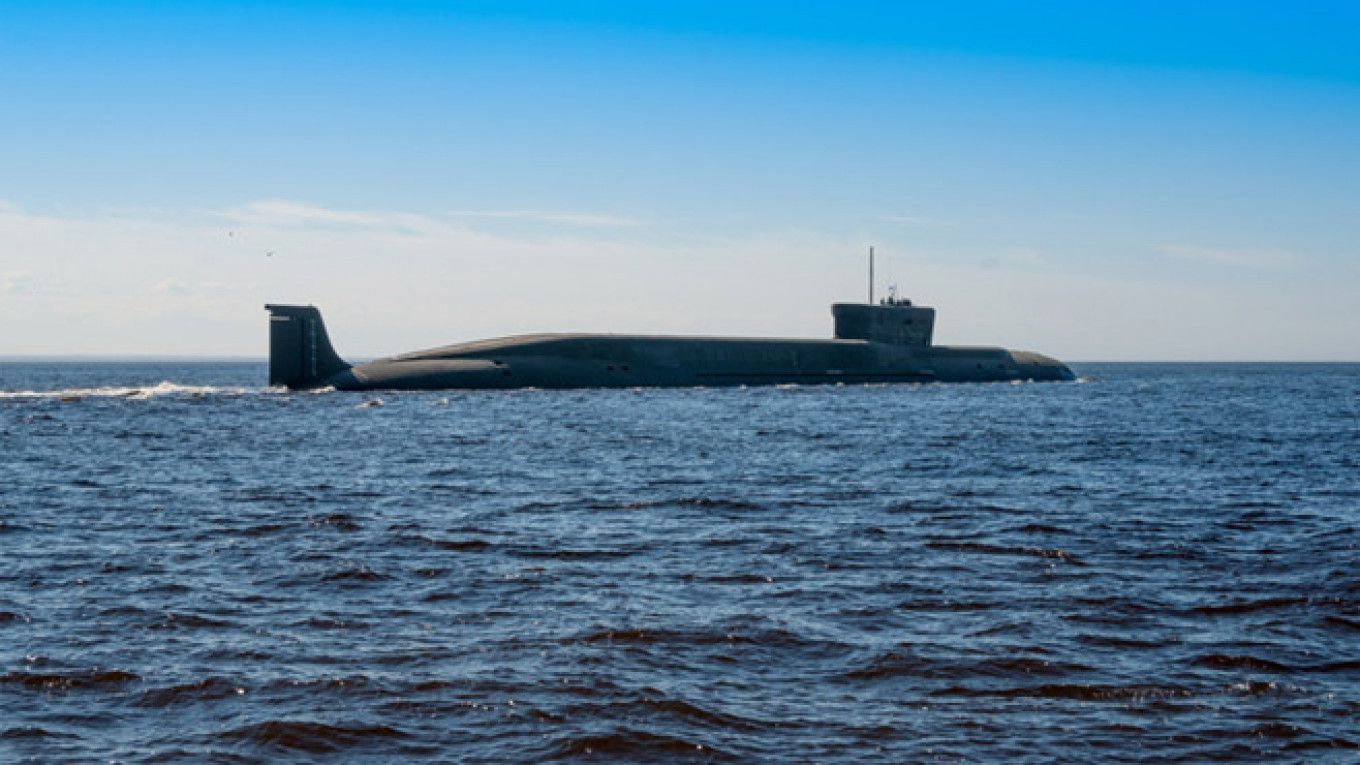A brand-new Russian submarine designed to carry nuclear missiles has successfully conducted a test launch of the long-delayed Bulava Intercontinental Ballistic Missile, or ICBM, showing that Russia remains a nuclear power to be reckoned with even as Moscow's relations with the West sour over Ukraine.
"The parameters of the missile's trajectory worked normally, and the missile's warheads successfully arrived at the Kura test range in Kamchatka," Defense Ministry spokesperson Major-General Igor Konashenkov was quoted by Interfax as saying after the launch on Wednesday morning. The missile was fired from a submerged position below the White Sea by the Vladimir Monomakh, one of Russia's new Borei class ballistic missile submarines.
The test marks the first time that the Bulava missile has been fired since a failed test launch in September 2013, after which Defense Minister Sergei Shoigu ordered a halt to testing while engineers worked the kinks out of the design — a process that has repeated itself several times since 2009.
In comments carried later on Wednesday by RIA Novosti, Russia's top navy official, Admiral Viktor Chirkov said Bulava will be tested two more times this year ?€” in October and November.
The Bulava missile was designed for the Borei-class submarines, Russia's latest "boomer" boats ?€” whose function is to lurk the ocean depths and await the order to launch a deadly salvo of nuclear warheads at foreign targets, usually big cities such as New York or Washington, D.C.
Capable of carrying up to 10 warheads and with a range of up to 8,000 kilometers, the Bulava is being counted on to replace rapidly aging Soviet-era missiles to maintain strategic parity with the U.S. and was often referred to as Russia's response to the U.S. plans of building anti-missile system in Eastern Europe.
The Boreis ?€” capable of carrying up to 12 missiles ?€” are post-Soviet Russia's replacement for the aging Typhoon and Delta IV-class boats, which were an integral part of the Soviet Union's nuclear deterrence force.
The Bulava has been plagued with delays, diminishing the strategic relevance of the new submarines, which entered service in 2009. But the Boreis are useful even without the IBCMs, a high ranking defense official told RIA Novosti last year.
"The Borei-class strategic missile submarines can carry out the tasks of multi-role attack submarines by carrying other weapons on board ?€” torpedoes and rocket-torpedoes. Just like a doctor of science can also teach math in a high school," the official said.
However, Russia already has brand new submarines that perform that role ?€” the Yasen-class attack submarines ?€” "hunter-killers," in naval terminology, designed to seek and destroy the enemy's "boomers" ?€” leaving the Borei submarines as high-priced, bloated boats performing functions they were not strictly designed for until Bulava is fully functional.
The Yasen- and Borei-class submarines represent a two-pronged campaign to rejuvenate the former glory of Russia's submarine fleet, which has largely fallen into disrepair since the collapse of the Soviet Union. As a whole, Russia is currently executing a $700 billion rearmament program across all branches of its military through 2020.
Contact the author at bizreporter@imedia.ru
A Message from The Moscow Times:
Dear readers,
We are facing unprecedented challenges. Russia's Prosecutor General's Office has designated The Moscow Times as an "undesirable" organization, criminalizing our work and putting our staff at risk of prosecution. This follows our earlier unjust labeling as a "foreign agent."
These actions are direct attempts to silence independent journalism in Russia. The authorities claim our work "discredits the decisions of the Russian leadership." We see things differently: we strive to provide accurate, unbiased reporting on Russia.
We, the journalists of The Moscow Times, refuse to be silenced. But to continue our work, we need your help.
Your support, no matter how small, makes a world of difference. If you can, please support us monthly starting from just $2. It's quick to set up, and every contribution makes a significant impact.
By supporting The Moscow Times, you're defending open, independent journalism in the face of repression. Thank you for standing with us.
Remind me later.


